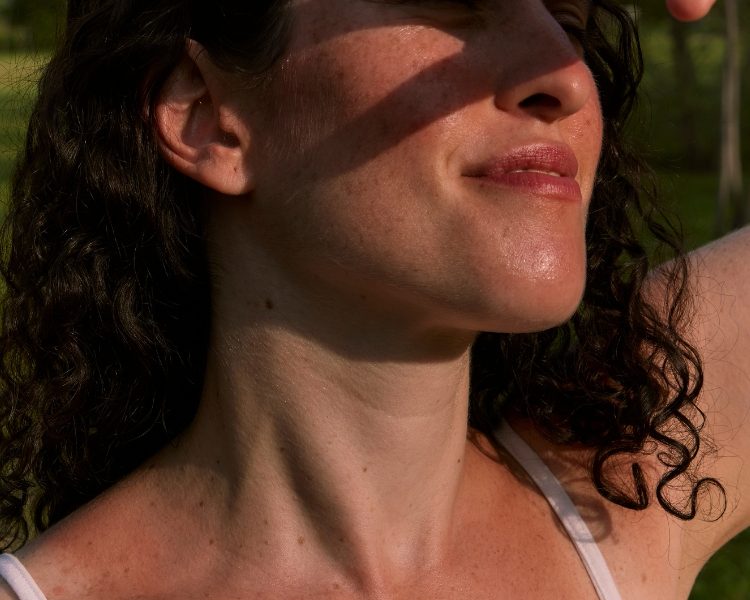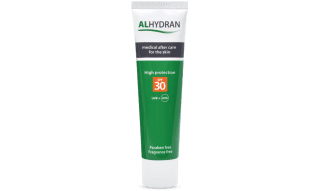Why sunburn itches more on sensitive or damaged skin
If you have sensitive skin like eczema, scar tissue, or previously burned areas, a sunburn can be more than just painful. It can cause intense, persistent itching that’s hard to ignore and it tends to be even worse on already damaged skin. So, what can you safely do to relieve that itch without making things worse?
What causes sunburn itch?
The intense itching sensation that follows a sunburn, sometimes referred to as hell’s itch, is not just a surface issue. It’s a result of neurogenic inflammation, where UV damage activates nerve endings in the skin and triggers an inflammatory response. This leads to the release of histamines, which cause redness, pain, and itch.
As the skin begins to heal, new cells push their way up while the damaged outer layer dries out and peels. This process can overstimulate sensory nerves, further intensifying the itch.
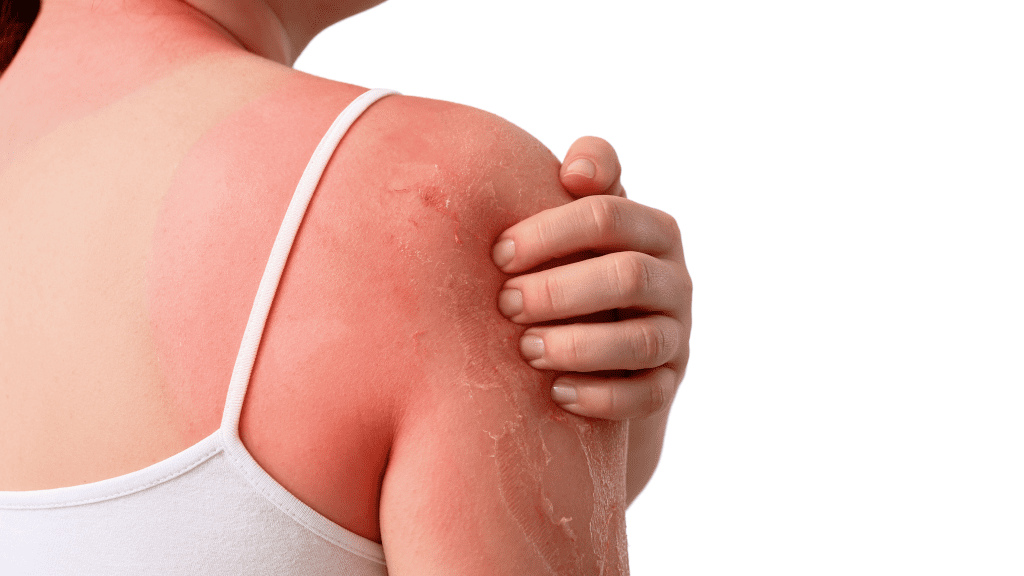
Why is it worse on eczema, scars or burned skin?
People with eczema-prone skin, scar tissue, or previous burns are more susceptible to severe sunburn itching. Here’s why:
Damaged skin barrier
Sensitive or damaged skin often struggles to retain moisture. This is due to increased transepidermal water loss (TEWL), the process by which water evaporates through the outermost layer of the skin. When TEWL becomes excessive, the skin dries out faster, leading to flaking and itchiness.
The illustrations below show the difference between a healthy (left) and a damaged (right) skin barrier.
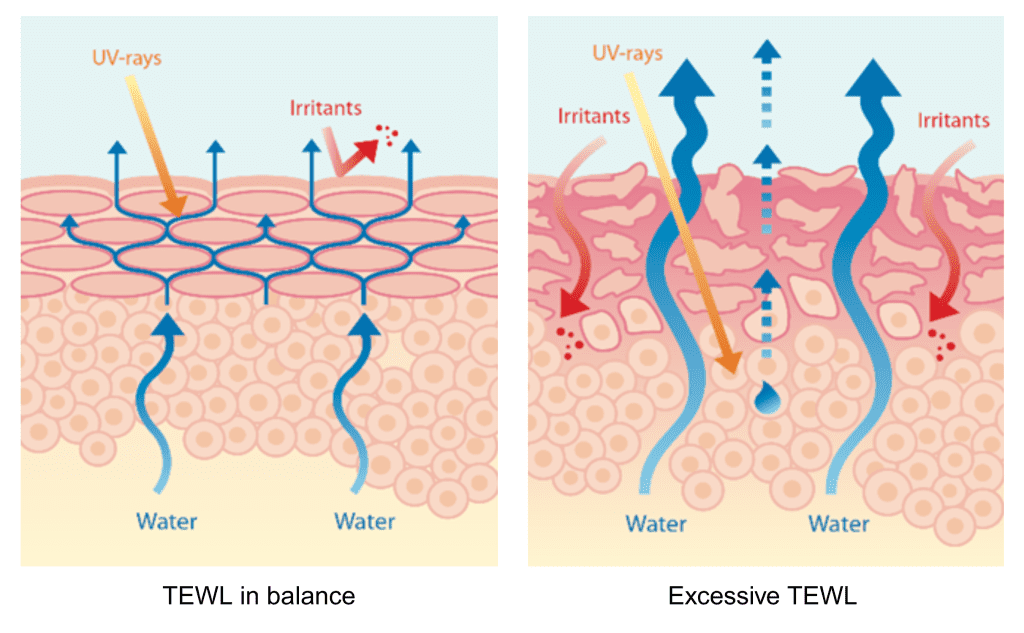
- On the left, the skin barrier is intact: water is retained, and the skin effectively blocks UV rays and irritants from penetrating deeper into the skin.
- On the right, the skin barrier is compromised: excessive water escapes, while UV rays and irritants easily enter the skin – leading to inflammation, itch and further barrier breakdown.
Maintaining hydration (replenishing moisture in the skin) and occlusion (creating a protective layer that prevents moisture loss) is essential for both scar and burn care and eczema-prone skin.
Nerve overactivation in scarred or burned skin
Scarred or previously burned skin may develop abnormal nerve growth, making it more reactive to heat and UV light. That’s why even a mild sunburn can cause a stronger itch response in these areas. This type of skin needs more than just cooling. It benefits from deep hydration, barrier repair and calming care that doesn’t overstimulate the sensitive nerve endings.
Eczema skin reacts differently
Some people with eczema notice their skin improves slightly in summer, low doses of UV light may reduce inflammation in the short term. But for many others, sun exposure, heat and sweating can actually trigger flare-ups. That’s because the skin barrier remains fragile, and external stressors like UV radiation, salt water or sunscreen ingredients can irritate it. Even with sun protection, eczema-prone skin often becomes itchy faster and reacts more intensely than healthy skin.
How to safely care for sunburn on sensitive or damaged skin
Before we dive into practical tips, let’s start with the most effective medical approach. If you’re dealing with sunburn on sensitive or already damaged skin, proper skin care goes beyond just cooling. The first step is targeted hydration.
Skin hydration is key
As explained earlier, sunburned and sensitive skin loses moisture more easily – especially when the skin barrier is already compromised by eczema, scarring or previous burn damage. Hydration is essential to reduce itching, restore comfort and support recovery. Choose a medical-grade cream that is hypoallergenic, fragrance-free and paraben-free, and contains ingredients known to soothe and protect vulnerable skin. Key ingredients to look for include:
- Aloe Vera – well-known for its soothing and cooling properties. ALHYDRAN uses a high concentration of pure, fresh Aloe Vera gel, harvested from Aruba and processed within 24 hours to preserve its active properties. Unlike other standard creams, It’s not made from diluted powders or extracts.
- Vitamin E (Tocopheryl Acetate) – supports regeneration and protects against oxidative stress.
- Glyceryl stearate – a glycerin-derived ingredient that helps soften the skin and reduce moisture loss.
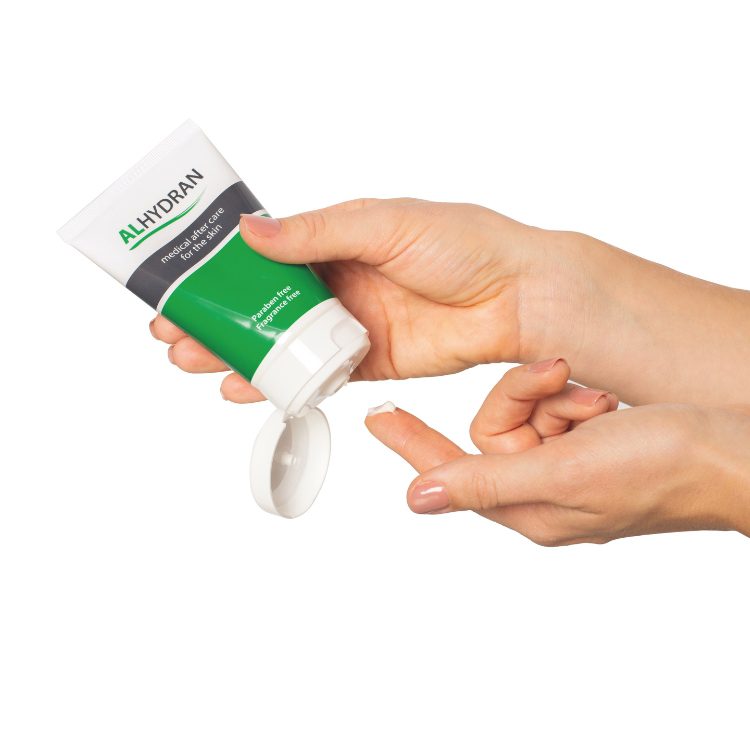
ALHYDRAN combines these skin-friendly ingredients in a deeply hydrating formula that helps prevent moisture loss and supports long-term skin barrier repair. It’s suitable for people dealing with sun-exposed scars, eczema-prone skin or previously burned areas. Whichever product you choose, make sure it’s free from alcohol, menthol, perfume or lanolin as these can further irritate fragile skin or disrupt healing.
Learn more about Aloe Vera in ALHYDRAN
UV protection afterwards
Even after the worst of the itch has passed, previously affected areas – such as scars, eczema or old burns – remain extremely sensitive to sunlight.
Because these skin types often have reduced pigmentation and less natural UV protection, they’re more likely to burn again, trigger new flare-ups, or develop long-term damage. Using a broad-spectrum SPF 30+ is essential. It protects against both UVB rays (which cause sunburn) and UVA rays (which penetrate deeper and accelerate skin aging and damage).
SPF 30 blocks about 97% of UVB radiation, while lower SPFs like 15 let through significantly more harmful rays. SPF 50, by comparison, only offers 1% more protection – but often gives a false sense of security, leading to less frequent reapplication.
We explain the differences between SPF levels – and what level is most effective for vulnerable skin – in understanding SPF factors.
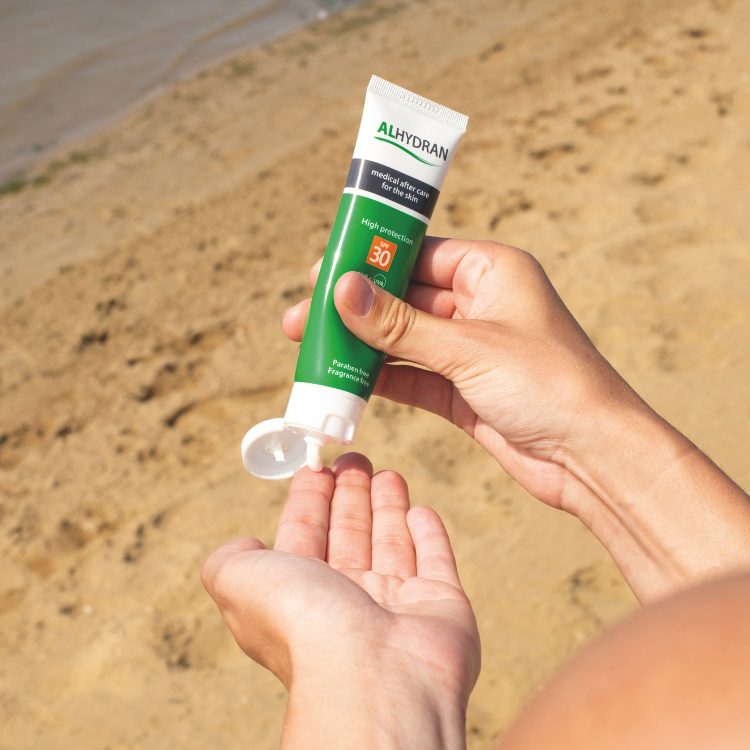
ALHYDRAN SPF30 is specifically developed for vulnerable skin. It combines hydration, barrier repair and UV protection in one formula, using both mineral and chemical UV filters for optimal protection – without irritating the skin. Just don’t forget: sunscreen needs to be reapplied every two hours, and after sweating or swimming.
Read our blog on UV radiation and vulnerable skin
Additional tips for itch relief
- Cool the skin gently – Apply a clean, cool damp cloth for 10 – 15 minutes. Avoid ice and hot showers. Repeat if needed to reduce inflammation.
- Avoid scratching – instead, gently press or tap the area if the urge arises.
- Wear soft, breathable cotton clothing – avoid synthetic fabrics.
- Stay hydrated – drink enough water to support the skin from the inside.
- Avoid stress – it can heighten your perception of itching and make symptoms feel worse.
Final thoughts
Sunburn on sensitive or previously damaged skin – such as eczema, scars or old burns can lead to intense and prolonged itching. This blog explained how UV radiation impacts the skin barrier and nerves, and why proper hydration and UV protection are essential. By keeping your skin cool, protected, and well cared for, you can ease discomfort and help it heal. Medical creams like ALHYDRAN and ALHYDRAN SPF 30 provide deep hydration and sun protection, especially for sensitive or damaged skin. Simple habits also help – like avoiding scratching, drinking plenty of water, and wearing soft, breathable clothing to stay comfortable as your skin recovers.
References
- Monstrey, S., & Hoeksema, H. (2013). Scar management by means of occlusion and hydration: A comparative study of silicones versus a hydrating gel-cream. Burns, 39(6), 1437-1448. https://doi.org/10.1016/j.burns.2013.03.025
- Sainz-Díaz, C. I., et al. (2018). Neurogenic inflammation in sunburned skin. Journal of Cosmetic Science.
- Scar management by means of occlusion and hydration – summary – final ppt (EBA 2016).
